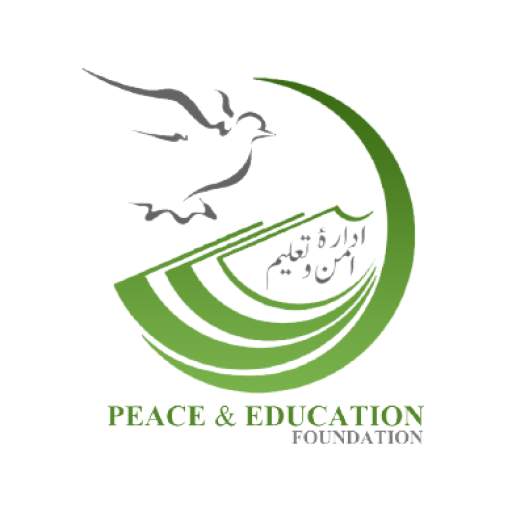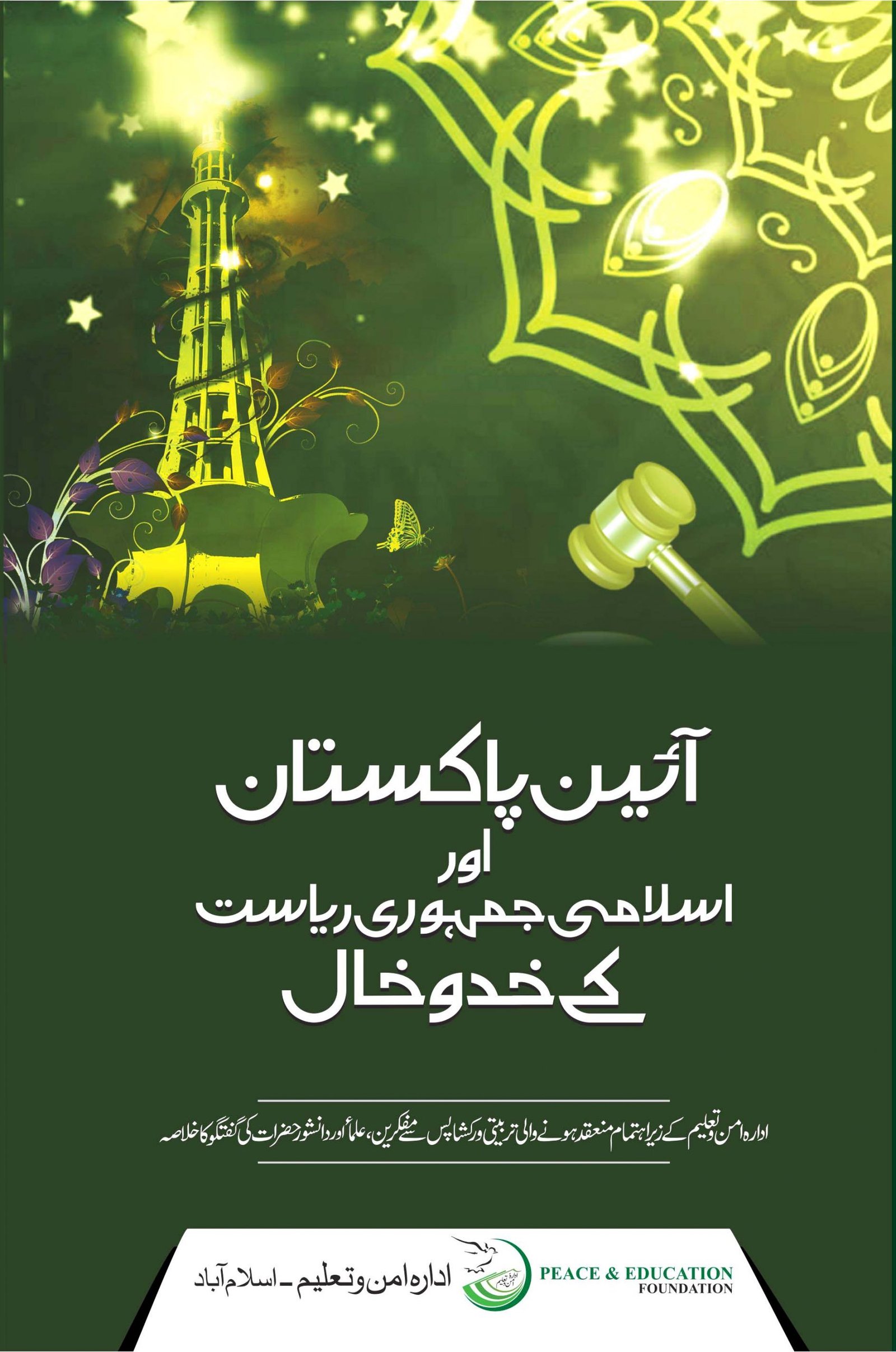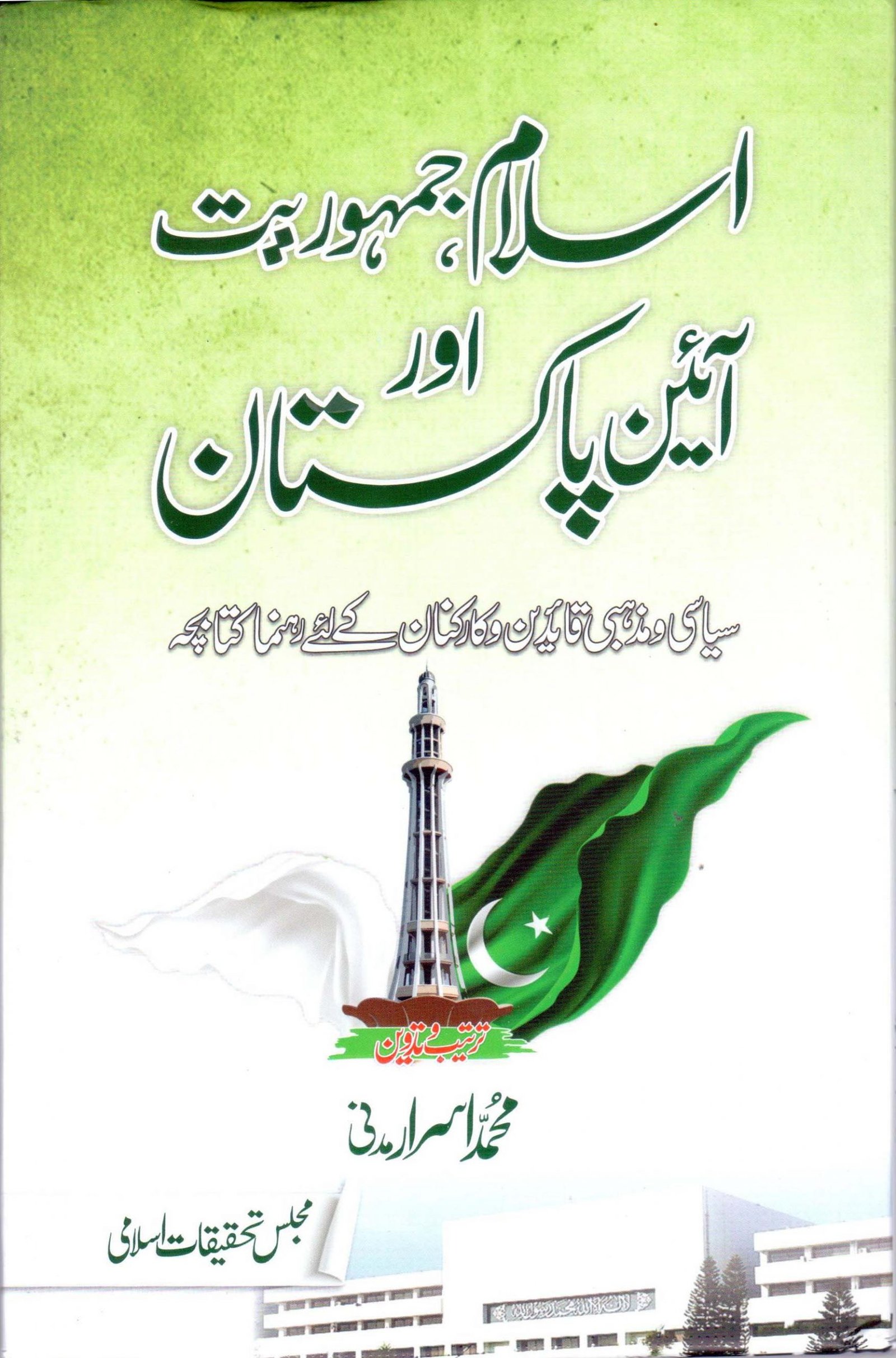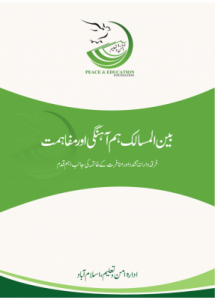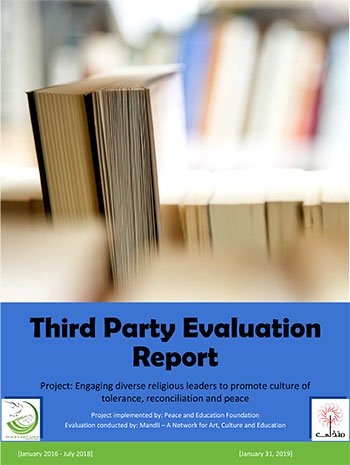Overview of PEF’s Engagement on Democracy:
Peace and Education Foundation (PEF) with the support of National Endowment of Democracy has been working to promote the democratic system and democratic values in Pakistan since 2016 by engaging religious leaders and youth. The flagship project under this collaboration, “Strengthening Support for Democratic Values among Religious Leaders and Youth in Pakistan”, completed its seven-year programming in 2023 – 2024. In our pursuit of democracy in Pakistan, PEF recognize the critical need to engage the vulnerable segments such as youth, and religious community as well as the larger society to address the anti-democratic narratives. These pivotal demographics, often susceptible to manipulation, are precisely the focus of PEF’s project engagement.
Strategic Aim: Our overarching strategic aim is to promote democratic values, ethnic and religious pluralism, particularly in light of the rising anti-democratic narratives and extremist movements in Pakistan. We are dedicated to amplifying narratives of peace and building inclusive societies through capacity-building, publications and follow-up social action plans.
THE OVERALL PROJECT ENGAGEMENT:
|
WIDER EXPANSION OF PEF’S ENGAGEMENT ON DEMOCRACY |
|
| Primary Capacity Building Workshops for Religious Leaders (2016 – 2019)
|
300 |
| Primary Capacity Building Workshops for Youth (2020 – Oct 2023)
|
210 |
| DEEPER ENGAGEMENT BY RECONVENING RELIGIOUS LEADERS AS ‘DEMOCRATIC ADVOCATES | |
| Advanced Capacity Building and Mentorship Training for Religious Leaders. | 86
(Oct 2016 – Nov 2020)
|
| ENGAGEMENT THROUGH DIALOGUE FORUMS & FGDS | |
| (12) Dialogue Forums with Religio- Political Groups and wider stakeholders | 338
Oct 2017 – Sep 2019) |
| (05) FGDs with diverse Stakeholders (Political Actor, Religious Leaders & Civil Actors)
|
122
(Oct 2019 – Sep 2020) |
Since 2016 till now PEF has conducted multiple capacity-building workshops for youth and religious leaders in various regions of KP, Punjab, Sindh and Balochistan.
In the first project 2016-2017, PEF’s focus was to create a conducive environment and increase acceptance within faith communities to promote democracy. The first year was successful as the religious leaders showed openness to the concept and actively participated in the project activities. Building upon this success, PEF continued to work with the religious leaders in the subsequent years and expanded the network of Democratic Advocates geographically and engaged diverse stakeholders including leadership and representatives of religio-political parties, community leaders and activists and youth from madrasah and university in carefully designed programs such as Dialogue Forums, Focused Group Discussions, Conferences and Digital/ Social Media campaign. Prominent religious scholars, subject matter experts on democracy, academicians, politicians and media persons were invited as speakers in capacity-building workshops.
Once trained, PEF Advocates for Democracy conducted a number of follow-up community engagement programs within their communities, including dialogue forums, seminars, conferences, workshops; and also widely disseminated message through social media, print and electronic media. These trained advocates for democracy under the follow-up activities have held 17,000 community engagement programs in their respective communities.
IMPACT AND SUCCESS STORIES:
Since 2016, the Peace and Education Foundation (PEF) has made significant strides in its mission to strengthen democracy in Pakistan. Our extensive efforts have included conducting impactful training workshops in major cities across country and creating impact through Advocates for Democracy.
Success Story 01- Hafiz Junaid Azeem:
The Participation In Democracy Workshop Has Contributed In Mobilizing Youth To Contest Local Body Elections In Sindh
In the words of Mr. Hafiz Junaid Azeem,
“PEF organized a three-day capacity building programs on theme of Islam and Democracy, initially I had concerns that democracy is imposed on us. I asked questions from different trainers and have detailed discussion on these themes. As a result of these discussions, I realized that my perspective and thinking is not right, at the same time I realized that to bring real democracy youth should also become part of the system through electoral process. I decided to contest the local-body elections and also became an active member of the youth wings of our political party and conducted election campaign and relief activities. I am trying my best to create an example for my fellow youth particularly from madrasahs and religious community so that they can see that a young religious leader is not confined to mosque but he can also be part of the democratic system and play a role in changing the system.”
Hafiz Junaid Azeem, a young social activist and a PEF Trained Democratic Advocate from Karachi, Sindh. As a graduate of Jamia Binoria Alamia, Karachi, Junaid’s initial perception of democracy clashed with his religious beliefs. He once saw it as a Western system contrary to Islam, advocating for the Caliphate model. However, his perspective evolved. Through a three-day capacity-building workshop in Karachi on June 18-20, 2022, Junaid interacted with experienced experts and fellow youth members from diverse religious and political backgrounds. He discovered the significance of youth in political participation and how individual efforts can fortify the system.
Inspired, Junaid made a commitment. He’s now submitting nomination papers for the upcoming local government elections, vying for the position of Vice Chairman in his Union Council in Karachi. He has successfully mobilized his community to address local challenges and provide relief to underserved communities. Junaid believes that workshops like these empower and embolden youth to take meaningful initiatives in their communities.
Please click the link below to see Junaid Azeem’s views: https://www.facebook.com/YouthAdvocatesforDemocracy/videos/126528193481262/
Success Story 02 – Tooba Ahmed
PEF’s Engagement program created enabling environment for youth to support democracy in their circle of Influence
In the words of Ms. Tooba Ahmed,
“Democracy is not about rule of majority but it is also about the duties of majority towards majority. Democracy is not about formation of the government only, it’s about establishing and function of a system. PEF provided me a platform to closely understand both the systems, as well as how to bridge gaps between madrasah and university students. The platform enabled us to promote democracy, and democratic values, to raise awareness in our communities about the rights, duties and citizens activism.”
One of the female participants from Faisalabad Ms. Tooba Ahmed, currently perusing her doctoral degree from Government College University (Faisalabad, Punjab). Before attending the training Ms. Tooba had no exposure or interaction with the religious community and madrasahs or the religious leaders, despite several attempts she was not able to have any access to the local madrasahs. Due to PEF training Ms. Tooba was able to closely interact with the madrasah students and know their perspectives on religious freedom and democracy, which not only broaden her understanding but also helped her in her research as part of her academic degree. Later, Ms. Tooba also hosted several Facebook live sessions and community engagement programs in which she invited prominent religious leaders and had panel discussions. Ms. Tooba also participated as a guest speaker in a radio show on state of religious freedom in Pakistan. The training and mutual learning opportunity not only helped her in getting the deeper insight and develop a network with local Youth Advocates and Mentors. It became apparent that she had become more confident and that she intended to pursue her research degree in promotion of minority rights.
Please click on the link to see the documentary on the project impact and success:
Journey of Change of PEF Youth Advocates for Democracy: https://www.facebook.com/YouthAdvocatesforDemocracy/videos/244977975227293/
Case Study-03: PEF’s Program on Democracy Mobilizing Religious Leader to Support Democracy Campaign in Their Circle of Influence:
From within the groups, the advocates expressed that PEF’s programs enhanced their understanding about democracy, democratic system including fundamental rights in light of the constitution of Pakistan. One such case study is PEF Democratic Advocates Muhammad Sajjad Raza Madani from Karachi. He expressed his view in this way:
“I already had misunderstandings about democracy, compatibility of Islam and democracy before coming to PEF’s workshops. Once I got opportunity to join PEF’s training program and listened to the talks on democracy, Islam and democracy and fundamental rights in light of constitutions of Pakistan. Furthermore, the exposure visit to the Provincial Assembly of Sindh was a great experience to learn about the legislative process and eventually how democratic institutions function. All these experiences and learnings mobilized us to further share these messages in our communities. As a result, I have organized a number of activities to promote human rights, religious freedom by inviting prominent religious leaders to deliver talks on Islam and democracy in these activities”.
Being a religious leader, I believe there are misconception about Islam and democracy prevails at large scale within the religious groups and communities. Keeping in view, I would like to share one example from my personal experience; within some of the religious groups, a Sunni Islamic organization (based in Pakistan), announce “travel for preaching Islam” around the year especially in vocations/ holidays to maximize the participation of common Muslims in these travels. When the general election, 2018 was announced, one of the groups announced a journey to traveling to another area for learning and propagating Qura’an and Sunnahs. They encourage their followers including madrasah teachers and students to join this trip on the election holiday.
When I came to know this, I launched a campaign on social media “The Importance of vote in Islam” and started a debate on social media how important for every single citizen of Pakistan to cast their vote on this occasion. I also personally met the leadership of the Tabligi Jamaat several times and finally convinced them to cancel this trip. To cast a vote is our fundamental right and responsibility in light of Islamic teachings and being a citizen of Pakistan. In my view, such efforts continues at community level bringing positive impact, I personally received many requests by other religious and religio-political groups to engage and educate their youth on Islam and democracy.”
Muhammad Sajjad Madani Quote about Compatibility of Islam and Democracy in PEF Democracy Conference: https://www.youtube.com/watch?v=lHJV-_9wvns
Success Story – 04: PEF Democratic Advocate Demonstrating
Courage to Raise Voice To Support Democracy
PEF Democratic Advocate Imam Abdul Hafeez from Faisalabad, Punjab revealed expressed his experience in these words,
“I used to give sermons against democratic systems and firmly believed that the prevailing democratic systems of Pakistan is not compatible with Islam and its teachings. However, after attending PEF’s training programs and constant follow up discussions with key speakers who delivered lectures in PEF’s training programs, I have been able to reflect and change my opinion on Islam and the current democratic system in Pakistan is the correct governance model for Muslims. This transformational journey does not end here. As a religious leader I am obliged to state my newfound ‘truth’ in my mosque and to my community at large.”
With the support of PEF, Dr. Abdul Hafeez organized a series of activities including seminars, dialogue sessions, speech competitions and conferences on various themes such as human rights, minority rights, rights of minorities enshrined in the constitution of Pakistan. Furthermore, to take this message at community level wasn’t easy for him when he started organizing the community outreach activities, some of his followers and members of the local community questioned his loyalty to his faith and community as he integrated democratic principals in his sermons and speeches. Soon his large fellowship and worshippers stop attending his mosque and sermon. The community reaction about his continued support for the democratic system grew stronger and he was investigated by the law enforcement agencies on motives and hidden agenda behind arranging the seminar and other activities on democracy related topics.
However, he stood determined and engaged the local community. During the activity, he briefed in details the purpose of activity and why religious leaders need to talk democratic system in light of Islamic teachings and that it is well suited for the Muslim everywhere. He also shared PEF’s publication on democracy with his followers which helped him to regain the trust of those local leaders and representatives of local administrations. His resilience and efforts made him successful in creating a conducive environment for open discussions within his mosque and community at large. He is now a recognized speaker who delivers talks on various events beyond his immediate community on democracy.
Dr Abdul Hafeez Quote about Compatibility of Islam and Democracy in PEF Democracy Conference: https://www.youtube.com/watch?v=wRcAKYxGA_o
PUBLICATIONS:
- ISLAM, DEMOCRACY AND CONSTITUTION OF PAKISTAN (2017): With the collaboration of a research team, Peace and Education Foundation conducted a research study addressing myths and misperceptions about democracy propagated by extremist Islamic groups in light of Islamic teachings. The research team comprised of Muhammad Israr Madni, Muhammad Jan and Rashid Yousafzai, drafted the booklet containing information about modern concept of democracy and its values, rule of law and human rights. PEF finalized and published 2,000 copies of the book. The book contents were then used to develop a comprehensive training module and a toolkit to capacitate selected faith leaders to raise public awareness and support for democratic principles.
(Link https://pef-global.org/wp-content/uploads/2020/05/democracy_book.pdf)
- CONSTITUTION OF PAKISTAN AND THE STRUCTURE OF ISLAMIC DEMOCRATIC STATE (2019): The second book is titled Constitution of Pakistan and the Structure of Islamic Democratic State was published to address the myths and apprehensions about democracy and democratic values In light of the constitution of Pakistan. PEF transcribed and reviewed the lectures conducted in previous capacity building programs (2018-19) by subject matter experts and trainers and converted them into the booklet format. The book contains the key themes of democratic principles such as, religious freedom, Islam and democracy, democratic principles, conflict resolution, human rights etc.
(Link: https://pef-global.org/wp-content/uploads/2020/05/aaeen_pakistan.pdf)
- DEMOCRACY, DEMOCRATIC VALUES AND ROLE OF YOUTH (2021) The youth leadership has enormous potential to promote democracy, democratic values, peace and good governance in bringing real change and prosperity. To mobilize support from youth, PEF specifically developed a book for Pakistani youth to address challenges in youth participation and encourage them to partake in democratic process. Keeping in view the potential role of youth, the book is based on the themes of Power and Potential of Youth for Leadership and the Importance of Political Participation, Challenges Youth Face in Advocating for Their Rights and Political Participation; Youth Actions to Strengthen Democracy and Promote Peace-building.
- Pakistani Youth and Democracy (2023): The fourth and Latest publication in the field of democracy is launched on October 22, 2023, at Movenpick Hotel Karachi. This publication marks a significant milestone for as it encapsulates essential aspects of democracy and its relevance to the youth. The book is specifically designed to enhance the understanding of the youth on democratic system and values in Pakistan. The themes of the book are based on Five (05) chapters including: (1) Mapping of Pakistani youth, SDGs and youth policies (2) Theoretical paradigm of Democracy and Democratic values (3) Pakistan and Democracy (4) Democracy in Muslim World (5) Pakistani Youth and Democracy.
The book is reviewed and endorsed by Dr. Qibla Ayaz (Chairman Council of Islamic Ideology), Dr. Tahira Jabeen (Director, Center for Social Development and Social Entrepreneurship), Dr. Amir Raza (Full Bright Scholar and Assistant Professor, Department of Politics University of Peshawar). The book is also reviewed and evaluated by Zafarullah Khan (Former Director Pakistan Institute of Parliamentary studies).
PEF’S ANNUAL CONFERENCES ON PROMOTING DEMOCRATIC VALUES:
PEF in the pursuit of its mission to strengthen Democratic system and values in Pakistan, orchestrated a trilogy of annual conferences in 2020, 2022, and 2023 in collaboration with Institute of Regional Studies and Council of Islamic Ideology. These distinguished events serve as a paramount platform for disseminating PEF’s research findings to an insightful audience.
Moreover, these conferences stand as a distinguished tribute to the dedication and contributions of our Advocates for Democracy from youth and religious community, who represent a rich tapestry of religious backgrounds, and who have played pivotal roles in PEF’s democracy program. Their efforts have been instrumental in shaping a society that thrives on inclusivity and democratic principles, ensuring the continuity of such transformative endeavors. The conferences and seminars invited prominent scholars, practitioners, activists and leaders, including:
- Zafarullah Khan (Former Director, Pakistan Institute for Parliamentary Services),
- Khursheed Nadeem, Renowned Journalist, Scholar & Anchor Person
- Husnul Amin (Director, Iqbal Institute of Research and Dialogue).
- Barrister Zafarullah, Former Federal Law Minister
- Shaheera Jalil Albasit, (Youth Activist leading Youth Election Quota Campaign in Pakistan)
- Shams-ur-Rehman (Chairman, Interfaith Studies Department, Allama Iqbal Open University)
- Ikram-ul-Haq (Secretary, Council of Islami Ideology),
- Maulana Israr Madni, President of International Research Council for Religious Affairs (IRCRA)
- Junaid Ahmad, (Chairman of National Environmental Consulting Management)
- Nadeem Abbass (Religious scholar and faculty member, NUML University)
